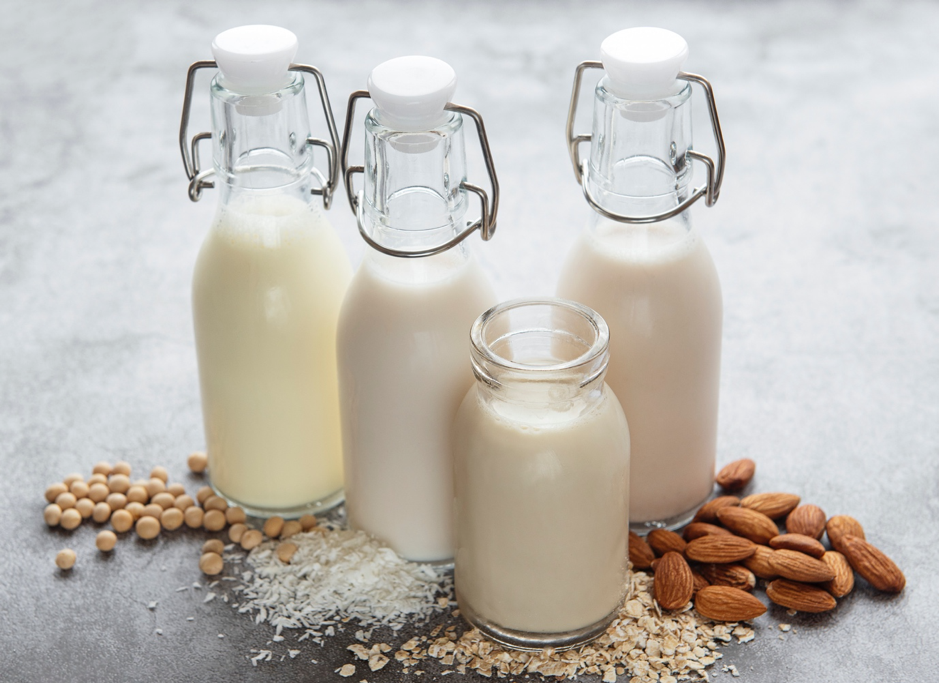Milk is a great source of vitamins and minerals, especially calcium. It’s crucial for maintaining healthy bones. As part of a balanced diet, nutritionists advise consumers to consume milk along with other dairy products like yoghurt and cheese each day.
Milk is a nutritious beverage that provides several benefits to the body. Here are some of the key benefits of milk:
Calcium And Strong Bones:
Milk is an excellent source of calcium, which is essential for the development and maintenance of strong bones and teeth. It also contains other minerals like phosphorus and magnesium, which work together with calcium to support bone health.
Protein For Growth And Repair:
Milk is a good source of high-quality protein, which is important for the growth and repair of tissues in the body. It provides all the essential amino acids necessary for protein synthesis.
Vitamins And Minerals:
Milk is rich in various vitamins and minerals, including vitamin D, vitamin B12, potassium and iodine. Vitamin D helps the body absorb calcium, while vitamin B12 is important for red blood cell production and neurological function.
Hydration:
Milk is composed mostly of water, making it a hydrating beverage. Staying properly hydrated is important for maintaining overall health and supporting various bodily functions.
Weight Management:
Milk can be a part of a healthy diet for weight management. It provides a feeling of fullness due to its protein content, which may help reduce excessive calorie intake.
Muscle Recovery:
Milk contains a good balance of carbohydrates and protein, making it an effective post workout recovery drink. The protein helps repair and rebuild muscle tissue, while the carbohydrates replenish glycogen stores.
Heart Health:
Some studies suggest that moderate consumption of milk and dairy products may be associated with a reduced risk of cardiovascular diseases, such as hypertension and stroke. However, individual responses may vary and it’s important to consider overall dietary patterns and lifestyle factors.
It’s worth noting that while milk provides many benefits, it may not be suitable for everyone. Some individuals are lactose intolerant or have allergies to milk proteins. In such cases, alternative sources of nutrients should be sought. It’s always a good idea to consult with a healthcare professional or registered dietitian for personalized advice based on your specific needs and health conditions.
Alternatives For Cow Milk
Oat Milk
Oat milk has gained popularity as a dairy milk alternative, especially among those who follow a plant-based or lactose-free diet. Here are some of the pros and cons of oat milk:
Pros Of Oat Milk:
Nutritional Benefits: Oat milk is typically fortified with nutrients such as calcium, vitamin D and vitamin B12, making it a comparable alternative to cow’s milk in terms of these essential nutrients.
Heart Health:
Oat milk is naturally low in saturated fat and cholesterol, which may benefit heart health. Additionally, oats contain beta-glucan, a type of soluble fiber that has been linked to lower cholesterol levels.
Plant-Based And Lactose-Free:
Oat milk is a suitable option for individuals who follow a vegan or lactose-free diet. It provides a dairy-free alternative that can be used in cooking and baking and as a milk substitute in various beverages.
Allergen-Friendly: Oat milk is generally well-tolerated by individuals with dairy, soy, or nut allergies, making it a safe option for those with specific dietary restrictions or sensitivities.
Environmental Sustainability: Compared to dairy milk, oat milk generally has a lower environmental impact, as it requires less water and land to produce. It also generates fewer greenhouse gas emissions.
Cons Of Oat Milk:
Lower Protein Content: Oat milk typically contains less protein compared to cow’s milk. If protein intake is a concern, individuals may need to ensure they obtain sufficient protein from other dietary sources.
Natural Sugars:
Some commercially available oat milk products may contain added sugars for flavour enhancement. It’s important to read labels carefully and choose unsweetened varieties or those with minimal added sugars, especially if you are watching your sugar intake.
Potential Gluten Contamination:
Oats themselves are gluten-free, but they can be processed in facilities that handle wheat, barley, or rye, leading to potential cross contamination. Individuals with gluten intolerance or celiac disease should opt for certified gluten-free oat milk.
Processing And Additives:
Some brands of oat milk may contain additives, stabilizers, or emulsifiers to enhance texture and consistency. While these additives are generally recognized as safe, individuals who prefer minimal processing may prefer homemade oat milk or products with fewer additives.
Digestive Issues:
Oat milk contains a type of fibre called oat beta-glucans, which can cause digestive discomfort in some individuals, particularly if consumed in large amounts. It’s best to introduce oat milk gradually and observe any potential digestive reactions.
Uses
Oat milk is a versatile dairy milk alternative that can be used in various ways. Here are some common uses of oat milk:
- Oat milk can be added to coffee or tea as a non-dairy creamer. Its creamy texture and mild flavour make it a popular choice for those who prefer plant-based options in their hot beverages.
- Oat milk can be used as a base for smoothies, providing a creamy and slightly sweet flavour. It blends well with fruits, vegetables and other smoothie ingredients.
- Oat milk can be poured over cereal or used as a liquid in cooking oatmeal. It adds a creamy consistency and a touch of sweetness to breakfast dishes.
- Oat milk can be used as a substitute for cow’s milk in baking recipes. It works well in cakes, muffins, pancakes, and other baked goods. Keep in mind that the slightly sweet flavour of oat milk may subtly influence the taste of the final product.
- Oat milk can be used as a base for creamy sauces and soups. It can also be used as a dairy-free substitute in recipes that call for milk or cream, such as creamy pasta sauces or mashed potatoes.
- Oat milk can be used in various dessert recipes, such as puddings, ice creams and even homemade popsicles. Its creamy texture helps create a smooth and satisfying treat.
Oat milk can be made at home by blending oats and water and then straining the mixture. This homemade oat milk can be used in any recipe that calls for oat milk and allows you to control the ingredients and customize the flavour to your liking.
When using oat milk in recipes, it’s important to consider the consistency and sweetness of the milk, as it may affect the final outcome. Adjustments may need to be made to the recipe to account for any variations in texture and flavour compared to cow’s milk.
Overall, oat milk provides a versatile and dairy-free option that can be enjoyed in a variety of ways, making it a popular choice for individuals seeking plant-based alternatives or those with lactose intolerance or allergies.
Almond Milk
Almond milk is a popular dairy milk alternative made from ground almonds and water. Here are some of the pros and cons of almond milk:
Pros Of Almond Milk:
Low In Calories: Almond milk is typically lower in calories compared to cow’s milk, making it a suitable option for individuals who are watching their calorie intake.
Lactose-Free And Vegan: Almond milk is free of lactose, making it a good alternative for those who are lactose intolerant. It is also suitable for vegans and individuals following a plant-based diet.
Nutrient Content: Almond milk is often fortified with vitamins and minerals, such as vitamin D, vitamin E, calcium and sometimes vitamin B12. This helps to enhance its nutritional profile and make it a comparable alternative to cow’s milk in terms of these nutrients.
Heart Health: Almond milk is low in saturated fat and cholesterol, which can benefit heart health. It also contains monounsaturated fats, which are considered heart-healthy fats.
Allergen-Friendly: Almond milk is naturally free of lactose, soy and gluten, making it a suitable option for individuals with allergies or intolerances to these common allergens.
Cons Of Almond Milk:
Lower Protein Content: Almond milk is generally lower in protein compared to cow’s milk. If protein intake is a concern, it’s important to obtain protein from other dietary sources to ensure adequate intake.
Potential For Additives: Some commercially available almond milk products may contain additives such as sweeteners, thickeners and preservatives. Reading labels and choosing unsweetened or minimally processed varieties can help minimize the intake of additives.
Nut Allergy Considerations: Almond milk is made from almonds, which are tree nuts. Individuals with nut allergies should avoid almond milk and choose other nondairy alternatives such as oat milk or soy milk.
Environmental Impact: Almond milk production requires a significant amount of water. In regions where water scarcity is a concern, the environmental impact of almond milk production can be significant.
Digestive Issues: Some individuals may experience digestive discomfort or bloating when consuming almond milk, particularly if they have a sensitivity to almonds or other components in the milk. If you experience any adverse reactions, it’s best to discontinue use and consult with a healthcare professional.
Uses
When using almond milk in recipes, it’s important to note that its consistency and flavour may differ slightly from cow’s milk. Adjustments may be needed in recipes to account for these variations.
- Almond milk can be enjoyed on its own as a refreshing beverage. It can be served chilled, over ice or even warmed up with a sprinkle of cinnamon or nutmeg for a cozy drink.
- Almond milk is commonly used as a dairy-free creamer in coffee and tea. It adds a creamy texture and a subtle nutty flavour to hot or iced beverages.
- Almond milk is a popular choice for pouring over breakfast cereals or using as a liquid in cooking oatmeal. It adds a creamy consistency and a hint of sweetness.
- Almond milk can be used as a base for smoothies, providing a creamy texture and a nutty undertone. It blends well with fruits, vegetables and other smoothie ingredients.
- Almond milk can be used as a substitute for dairy milk in baking recipes. It works well in cakes, cookies, muffins, and other baked goods. However, keep in mind that its subtle nutty flavour may influence the taste of the final product.
- Almond milk can be used in savory dishes and sauces as a dairy-free alternative. It can be used in creamy pasta sauces, soups and creamy dressings, adding a mild nuttiness to the flavour profile.
- Almond milk can be used in various dessert recipes, including puddings, ice creams and dairy-free custards. Its creamy texture and mild flavour makes it a versatile ingredient in sweet treats.
- Almond milk can be made at home by blending soaked almonds with water and then straining the mixture. This homemade almond milk can be used in any recipe that calls for almond milk, allowing you to control the ingredients and customize the flavour.
Soy Milk
Soy milk is a plant-based milk alternative made from soybeans and water. It has a creamy texture and is widely consumed by individuals following a vegan or lactose free diet. Here are some common uses, as well as the pros and cons, of soy milk:
Uses of Soy Milk:
- Soy milk can be consumed on its own as a beverage, served chilled or at room temperature. It can also be flavored with vanilla, chocolate, or other additions for a variety of tastes.
- Soy milk is a popular choice as a dairy-free creamer in coffee, tea, and other hot beverages. It can add creaminess and a subtle nutty flavour.
- Soy milk can be poured over breakfast cereals or used as a liquid in cooking oatmeal. It provides a creamy consistency and adds a touch of flavour to the dishes.
- Soy milk can serve as a base for smoothies, providing a creamy texture and a source of plant based protein. It pairs well with fruits, vegetables and other smoothie ingredients.
- Soy milk can be used as a substitute for cow’s milk in various baking recipes. It works well in cakes, cookies, muffins and bread, contributing to the moisture and texture of the final product.
- Soy milk can be used in savory recipes and sauces as a dairy-free alternative. It can be incorporated into creamy sauces, soups and creamy dressings.
Pros Of Soy Milk:
Nutritional Profile: Soy milk is a good source of plant based protein, containing all the essential amino acids needed by the body. It also provides various vitamins and minerals, including calcium, vitamin D and vitamin B12 (if fortified).
Lactose-Free And Vegan: Soy milk is naturally free of lactose and is suitable for individuals with lactose intolerance or those following a vegan or vegetarian diet.
Heart Health: Soy milk is low in saturated fat and cholesterol and may help promote heart health. It contains unsaturated fats, fibre and isoflavones, which are plant compounds that have been associated with heart health benefits.
Bone Health: Soy milk is often fortified with calcium and vitamin D, which are essential for bone health. These nutrients, along with the protein content, can contribute to maintaining strong and healthy bones.
Cons Of Soy Milk:
Allergen Considerations: Soy milk is derived from soybeans, which are considered a common allergen. Individuals with soy allergies should avoid soy milk and opt for alternative plant-based milk options.
Phytoestrogens: Soy contains compounds called phytoestrogens, which are plant-based estrogens. While the effects of phytoestrogens are still debated, some individuals may prefer to moderate their intake, particularly if they have specific hormonal concerns or conditions.
Taste And Texture: The taste and texture of soy milk may differ from dairy milk, which may not appeal to everyone. It has a slightly nutty flavour that may take some getting used to.
GMO Concerns: Most commercially available soy milk is made from genetically modified soybeans. If avoiding genetically modified organisms (GMOs) is a concern, it is important to look for organic or non-GMO verified soy milk options.
As with any dietary choice, it’s important to consider individual needs, preferences and potential allergies or intolerances when deciding whether to include this alternative milk in your diet. If you have specific health concerns or questions, it’s advisable to consult with a healthcare professional or registered dietitian.



